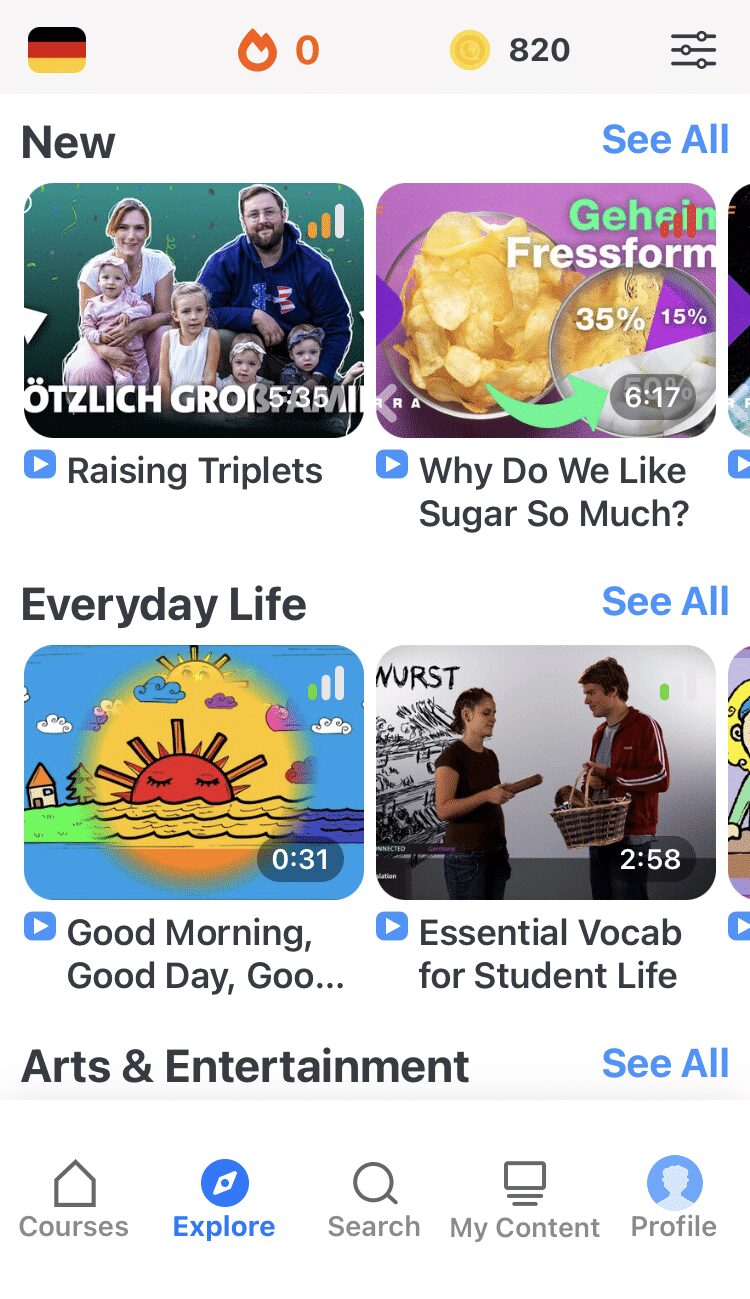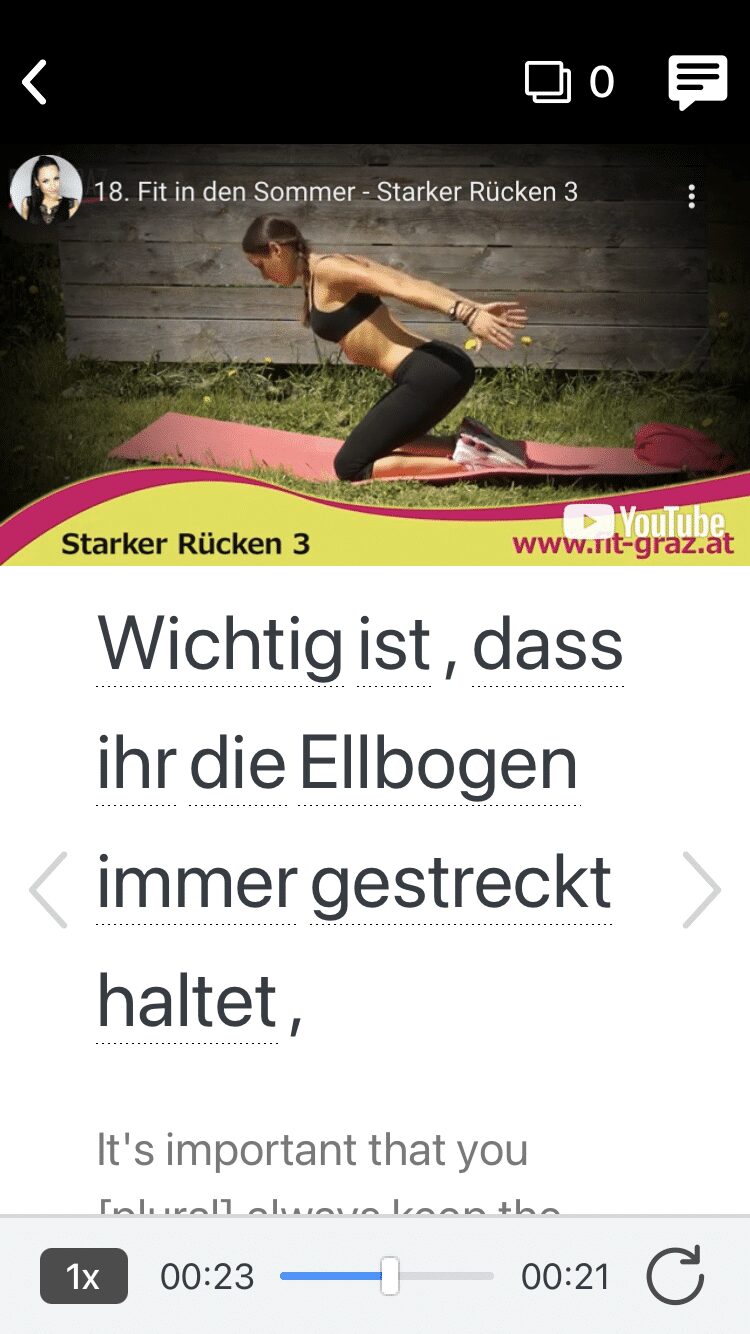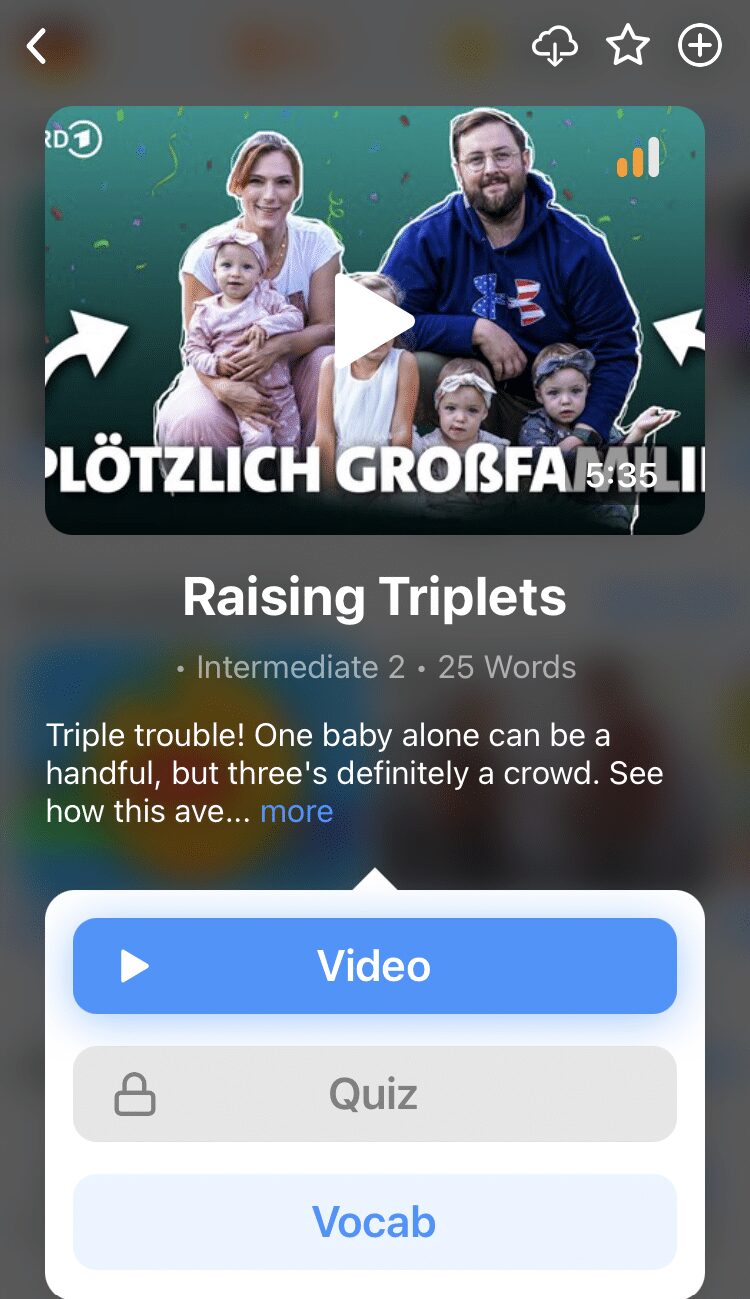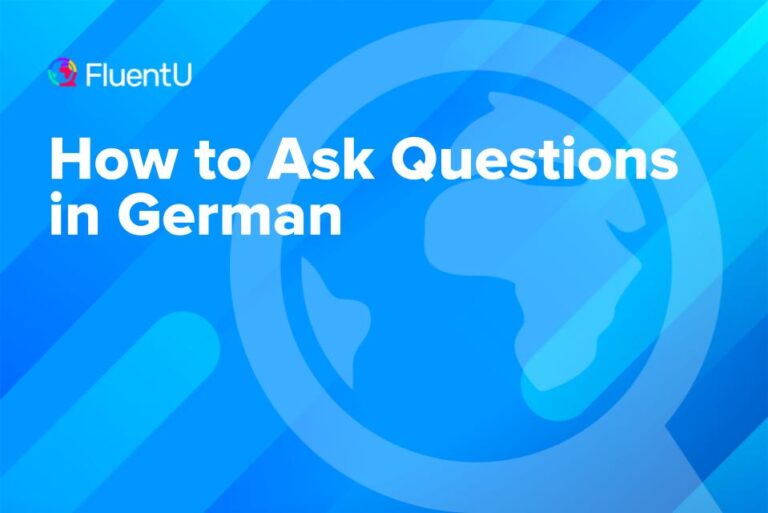Contents
- 1. Juten Tach (Good Day)
- 2. Keule (Bro/Man/Pal/Buddy)
- 3. Atze (Bro/Man/Pal/Buddy)
- 4. Bammel (Fear)
- 5. Brett (Door)
- 6. Futsch (Broken/Gone)
- 7. Helle (Clever/Bright)
- 8. Ick or Icke (I)
- 9. Kaff (Hicksville/Backwater)
- 10. Öljötze (Deadpan person/boring person)
- 11. Flitzpiepe (Nitwit/Birdbrain)
- 12. Sich kabbeln (To squabble)
- 13. Lulatsch (Beanpole; a tall man)
- 14. Kieken (To look)
- 15. Nasenfahrrad (Glasses/Specs)
- 16. Pampich (Cheeky/sassy)
- 17. Pladdern (To rain heavily)
- 18. Piepel (Young boy)
- 19. Rammdösich (Woozy/Dizzy/Groggy)
- 20. Stiefeln (To stride/to walk)
- 21. Molle (A glass or bottle of Beer)
- 22. Schlamassel (Difficult situation)
- 23. Dit is mir schnuppe (I don’t care)
- 24. Stampe (Divebar/Drinking den)
- How to Memorize Berlin Slang Words
- And One More Thing...
24 Berlin Slang Words

If you’re living in Berlin (or even just visiting) and you want to sound like a local, you’ll need to know some popular slang. In this post, you’ll learn 24 slang words commonly used in Berlin to add to your vocabulary.
This is the day-to-day language used in the city, which you probably won’t learn in your typical online language course or in-person classes. Practicing this Berlin slang will help you connect with locals and impress your German friends.
(Please note: the audio pronunciations in this post are in a “Standard German” accent, so they don’t sound exactly as they would coming from a real Berliner.)
Download: This blog post is available as a convenient and portable PDF that you can take anywhere. Click here to get a copy. (Download)
1. Juten Tach (Good Day)
Standard German Equivalent: Guten Tag
Juten Tach is simply the written form of the way a person with a Berlin accent would pronounce Guten Tag, which later became a typical way to say “Hello” in Berlin.
Juten Tach! Wie geht’s? (Good day! How are you?)
2. Keule (Bro/Man/Pal/Buddy)
Standard German Equivalent: Bruder or Alter
Berliners might refer to a close friend as their Keule, which literally means “mace”. But don’t worry, no bludgeoning is necessary, you can probably stick with a friendly fist bump instead. This one is most popular in the Wedding district in the North West of Berlin.
Hey Keule, wat geht? (Hey bro, what’s up?)
3. Atze (Bro/Man/Pal/Buddy)
Standard German Equivalent: Bruder or Alter
Here’s another way to refer to a good friend. You’ll hear this one favoured over Keule in the south West around Zehlendorf.
Meene Atze wird heut dreißig. (My buddy is turning thirty today.)
4. Bammel (Fear)
Standard German Equivalent: Angst
In Berlin, Bammel describes the feeling of doubt, fear and uncertainty.
Da brauchste keen Bammel zu ham! (You don’t need to be scared of that!)
5. Brett (Door)
Standard German Equivalent: Tür
Brett is used to describe doors, especially those in a house.
Mach’s Brett ran. Es zieht! (Close the door. There’s a breeze!)
6. Futsch (Broken/Gone)
Standard German Equivalent: kaputt or verloren
In Berlin, you can say futsch to say things that are broken, but it can also mean that whatever you’re talking about is gone or lost.
Meen janzes Jeld is futsch! (All my money is gone!)
7. Helle (Clever/Bright)
Standard German Equivalent: schlau
Helle is an adjective that describe a clever, switched-on kind of person.
Unsere neue Azubi is nich’ besonders helle. (Our new apprentice isn’t particularly bright.)
8. Ick or Icke (I)
Standard German Equivalent: ich
Ick or icke are just like Juten Tach, they’re a spelling that’s based on the Berlin accent. It’s pronounced like “ich” in Standard German.
Ick hab heut nüscht zu tun. (I have nothing to do today.)
9. Kaff (Hicksville/Backwater)
Standard German Equivalent: Ortschaft
In Berlin, Kaff means a small, suburban village that’s not interesting and which is isolated from urban areas and cities. You might hear the term j.w.d. in reference to such places, which stands for janz weit draußen (very far out).
Das ist so ein Kaff jwd. (That’s one of those backwater places way far out.)
10. Öljötze (Deadpan person/boring person)
Standard German Equivalent: ein langweiliger Mensch
If someone’s being a bit of a stiff bore, you might call them an Öljötze. Again, this is with the famed Berlin preference for “j” over “g”. Without the specific accent, it’d be an Ölgötze.
Der sitzt da wie een Öljötze. (He’s sat there like a real bore.)
11. Flitzpiepe (Nitwit/Birdbrain)
Standard German Equivalent: Dummkopf
In Berlin, you’re not an idiot, you’re a Flitzpiepe. This one is often used endearingly between friends or family, so it’s not as harsh as it may seem.
Wat machst du, du Flitzpiepe? (What are you doing, you nitwit?)
12. Sich kabbeln (To squabble)
Standard German Equivalent: sich streiten
Kabbeln is a slang verb found in various parts of North Germany that describes actions such as squabbling, arguing and fighting. It’s usually used to describe minor, short altercations.
Die Brüder Markus und Lukas kabbeln sich oft. (The brothers Markus and Lukas fight each other very often.)
13. Lulatsch (Beanpole; a tall man)
Standard German Equivalent: ein großer Mann
Lulatsch is an adjective that refers to tall, thin individuals.
Neben mir saß so ein Lulatsch. (Next to me sat a beanpole.)
14. Kieken (To look)
Standard German Equivalent: gucken
Look alive! Here’s another very typical Berlin word. It’s often used when someone is staring at something or someone.
If, for example, you’re donning an uncharacteristically stylish outfit that day, and your friend is goggling you in amazement, you might smugly reply: “Da kiekste, wa?” (Amazed, are we?)
Wat kiekst‘n so? (What’re you lookin’ at?)
15. Nasenfahrrad (Glasses/Specs)
Standard German Equivalent: Brille
Nasenfahrrad means “nose bike” when literally translated into English. It’s an ironic way to describe glasses in Berlin slang.
Naja, ick find ihn mit Nasenfahrrad schöner. (Well, I think he’s more handsome with glasses.)
16. Pampich (Cheeky/sassy)
Standard German Equivalent: frech
Pampich is an adjective used to describe someone who’s direct, sassy and bold. Again, like juten Tach, this is a way of writing the word to reflect the Berlin accent, as it would otherwise be pampig.
Jetzt werd ma nich pampich! (Now, don’t get sassy!)
17. Pladdern (To rain heavily)
Standard German Equivalent: heftig regnen
When raining heavily, the verb Berliners use to describe the weather is pladdern, as it’s shorter than the Standard German equivalent, heftig regnen.
Es pladderte die janze Woche lang. (It rained heavily all week long.)
18. Piepel (Young boy)
Standard German Equivalent: kleiner Junge
Though it may sound like the English “people”, Piepel means a young boy.
Schon als kleener Piepel hab ick viele Gedichte jeschrieben. (I was already writing poems as a young boy.)
19. Rammdösich (Woozy/Dizzy/Groggy)
Standard German Equivalent: benebelt / benommen / betäubt
Rammdösich is usually used to describe someone who’s tired, confused and unable to form clear thoughts. Once again, we’ve written this how it would be pronounced in the Berlin accent; it would otherwise be rammdösig.
Diese Hitze macht mich rammdösich. (This heat is making me woozy!)
20. Stiefeln (To stride/to walk)
Standard German Equivalent: [mit weit ausgreifenden Schritten]gehen
Stiefeln means walking with slow and far-reaching steps. It means “boots” in Standard German, so it might refer to the way you would have to walk when wearing some big snow or rainboots.
You’ll see in our example sentence below, the word stiefeln is in its past participle form—gestiefelt. But because we’re in Berlin, we’ve written it how it’d be pronounced in a proper Berlin accent, where the “g” sound is often replaced with a “j”.
Ick bin den janzen Weg von der Uni nach Hause durch den tiefen Schnee jestiefelt. (I strode all the way home from the university through the deep snow.)
21. Molle (A glass or bottle of Beer)
Standard German Equivalent: Bier
Molle is a classic bit of Berliner slang meaning either a bottle or glass of beer. You even go the whole hog and ask for a Molle mit Korn which is a beer and a shot of corn schnapps. Bottoms up!
Trinken wir noch ‘ne Molle. (Let’s have another beer.)
22. Schlamassel (Difficult situation)
Standard German Equivalent: schwierige Situation
In Berlin slang, Schlamassel is used to in difficult and troublesome circumstances.
Da hamma ‘n echten Schlamassel! (We’ve got a messy situation here!)
23. Dit is mir schnuppe (I don’t care)
Standard German Equivalent: Das ist mir egal
If you’re feeling indifferent about something, it’s all schnuppe to you! (We’re sorry to say that technology failed us on this one, and we couldn’t include the audio pronunciation because it wasn’t quite right.)
Is mir schnuppe, wat dit kostet. (I don’t care what it costs.)
24. Stampe (Divebar/Drinking den)
Standard German Equivalent: Kneipe
Stampe is a slang word used to describe small, cheap, local pubs in Berlin. (Again, technology has failed us in the pronunciation of this slang word.)
Das ist kein schickes Lokal, ist eher eine düstere, verräucherte Stampe. (It’s not a fancy bar, it’s a gloomy, smoky divebar.)
You can pick up more slang words and learn about different aspects of German culture on FluentU.
FluentU takes authentic videos—like music videos, movie trailers, news and inspiring talks—and turns them into personalized language learning lessons.
You can try FluentU for free for 2 weeks. Check out the website or download the iOS app or Android app.
P.S. Click here to take advantage of our current sale! (Expires at the end of this month.)
How to Memorize Berlin Slang Words
Make online friends from Berlin
Language exchange apps such as HelloTalk and Tandem will allow you to connect with people from Berlin who are looking for a language partner. Look for someone with similar interests to encourage more frequent conversations and a long-term (mutually beneficial) friendship.
You can also use italki to find native speakers in Berlin who can tutor you and help you practice your slang usage.
Visit Berlin to get some practice
Millions of people visit the German capital every year. To break into Berlin’s community and make new local friends, you can attend language exchange meetups there.
At an in-person language exchange, you can find Germans who might be interested in learning your native language while teaching you some Berlin slang in return.
Use flashcards
Making your own flashcards and using them to study can help you master new words. Flashcards are scientifically proven to be effective because they engage a mental faculty called active recall.
If you don’t have time to make your own, you can always use a convenient flashcard app to help you learn German. Many of these apps use spaced repetition, which means they repeat words and expressions over spaced intervals to improve your ability to remember them.
Try to memorize a few of these slang words a day and you’ll have them all down in no time. Then start using them in conversation to improve your confidence and comfort level.
You’ll soon be sprinkling them in with ease and recognizing them in German media!
Download: This blog post is available as a convenient and portable PDF that you can take anywhere. Click here to get a copy. (Download)
And One More Thing...
Want to know the key to learning German effectively?
It's using the right content and tools, like FluentU has to offer! Browse hundreds of videos, take endless quizzes and master the German language faster than you've ever imagine!
Watching a fun video, but having trouble understanding it? FluentU brings native videos within reach with interactive subtitles.
You can tap on any word to look it up instantly. Every definition has examples that have been written to help you understand how the word is used. If you see an interesting word you don't know, you can add it to a vocabulary list.
And FluentU isn't just for watching videos. It's a complete platform for learning. It's designed to effectively teach you all the vocabulary from any video. Swipe left or right to see more examples of the word you're on.
The best part is that FluentU keeps track of the vocabulary that you're learning, and gives you extra practice with difficult words. It'll even remind you when it’s time to review what you’ve learned.
Start using the FluentU website on your computer or tablet or, better yet, download the FluentU app from the iTunes or Google Play store. Click here to take advantage of our current sale! (Expires at the end of this month.)












